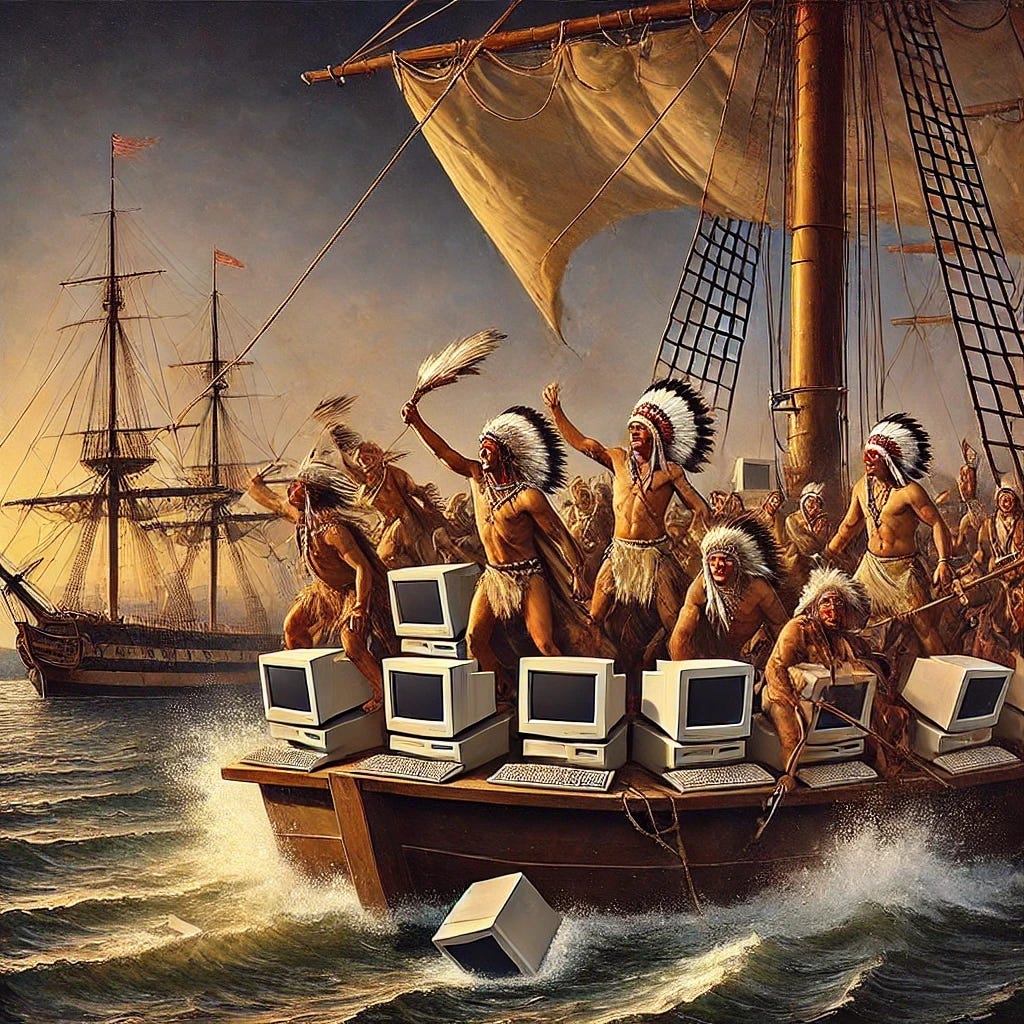Live Free With Linux
The personal computer market of today is dominated by two vile conglomerates which control what films you watch, what music you hear and what software you use. I refer, of course, to Mackintosh and Windows. They reduce their users to a pernicious form of serfdom through several methods. App subscriptions bleed users dry. Updates are frequently mandatory, in many cases making older files unusable. Any who dare challenge their dominance with better ideas are bought out, and in some cases their ideas are destroyed with crippling patents.
Most computers are filled with all manner of tracking software which monitors your buying habits, reading material, and other entertainment. Several years back, I discovered that Google had drawn an all too accurate picture of my situation in life and ideas. The deliberate alteration of downloaded content, especially in the case of e-readers, happens far more commonly than most people realize. There was a particularly notorious case of such alteration involving the works of Roald Dahl approximately two years ago. The near-monopolies held by today’s computing corporations are indeed little different from the Mercantilist grip of the East India company at the outbreak of the Revolutionary War.
As Colonial Americans made do without tea, we can do without the products of the great software firms. Linux is the most efficient way to do this. Many of the most common Linux distributions come pre-loaded with analogs of Word, Power Point, and Excel, which you own free and clear. There is also a cornucopia of mathematical and scientific software available. Alternatives to almost all such software as MATLAB and Autocad exist, and much of it is compatible with the Python programming language. Unlike Windows, the Linux operating system is practically impervious to the most common security threats, and rarely requires expensive anti-virus software.
Therefore, anyone seeking to escape the managerial system should install Linux. However, the battle for software independence is only one half of the war. At present, the state of independent hardware is woefully inadequate. Linux-based phones such as the Pine phone eke out a meager existence at the margins of the market. There is then an excellent opportunity to found a new company that makes truly open-source cell and flip phones, freed from the dictates of app stores. Open source codebases have also been robbed of their autonomy by donations from the likes of the Chan Zuckerberg Initiative. It is telling that the technology corporations themselves are dependent on open-source software. There are at least two solutions to this problem. The first is to simply found new open-source communities which refuse such donations. Another option is to infiltrate existing ones, when, upon reaching a majority, the infiltrating programmers vote to reject donor money.
In conclusion, Linux is the best tool with which to counter digital involution. Its infinitely adaptable nature lends itself readily to the creation of new machines. It is possible to run the Linux operating system on a single-board computer, the Raspberry Pi, for less than one hundred dollars. The widespread development of novel machines running the Linux operating system is indeed a necessary precursor to the next Heroic Age of Invention. A Linux economy would be one devoid of the financial incentives which have damaged our civilization so grievously. The waste of our brightest minds on the development of next years ‘features’ would be no more. As no one owns the meter, the kilogram or the alphabet today, word processors, databases, and other structural components of the Internet Age would be standards in this new world, and nothing more. Independent businessmen would no longer be beholden to faceless corporate behemoths for such fundamental tasks as keeping books. The lack of change in computing systems would make files from even centuries past readable. Therefore, try Linux today.
What would they do?




This is very well researched, I recommend you expand your ideas in a new Substack. My advice is mainly targeted at new users of Linux, or small businesses which do not have a lot of information to transfer over. In my experience working for different companies, I have realized that most people do not use that vast array of unique Microsoft "features". I am also aware that with regards to Linux, security is the responsibility of the user. The freedom of avoiding Windows and Mac surveillance is worth the inconvenience. Since both of the issues you mention discourage so many of us from switching to Linux, I am currently planning a consulting firm that makes defection to Linux easier.
> Alternatives to almost all such software as MATLAB and Autocad exist, and much of it is compatible with the Python programming language.
Massive caveat here: anyone looking to replace MATLAB or AutoCAD must also be willing to abandon the proprietary ecosystems surrounding those products, which supplement much of their value. Similarly, anyone switching from Microsoft Office must abandon their existing templates, add-ons, macros, and Visual Basic. The best way to avoid this colossal waste of expertise is to never begin to depend on such ecosystems in the first place, but most people are pipelined by educators and peer pressure before they have any chance to know better. The human soul's rational and virtuous movement toward self-improvement is thus captured, winding those who wish to master their own tools into an invisible net from which they cannot escape without starting over. This effect reinforces itself because anyone challenging the status quo in an industry must be able to compete with it, but an ideological position against proprietary software necessarily rejects the most expedient route to practical economic success among its competitive disadvantages.
> Unlike Windows, the Linux operating system is practically impervious to the most common security threats, and rarely requires expensive anti-virus software.
You have fallen for a common misconception. Linux servers themselves approach security by being located in vault-like datacenters and running as few software programs as possible. The primary protection that desktop Linux users enjoy is the inherently flawed "security by obscurity", which only lasts in general as long as victims with more money than sense are reputed to use more mainstream operating systems. Specifically, anyone who becomes a personal target of a cyber criminal has already lost the whole game unless they can truly trust in Apple, Google, or Microsoft, in which case there might still be a chance.
In terms of absolute security against threats excluding the software vendor itself, free (as in freedom) operating systems are significantly worse than Android, ChromeOS, iOS, macOS, and Windows. The major proprietary systems are more popular and subject to stronger evolutionary forces that eliminate less effective security paradigms. They hire and capitalize on cybersecurity experts, giving them reign and resources to actually make their ideas a reality instead of merely publishing research. By manufacturing their own hardware or cooperating with hardware manufacturers they are able to create products that implement security at a deeper level than any independent altruist may hope to accomplish. Android and ChromeOS are based on Linux and other open source software, but their heavily customized and hardware-dependent security configuration is not portable to other distributions that don't have Google's wealth, talent, and connections. Application developers that want to reach Google (or Apple) users must conform to security policies that simply don't exist in Windows and Linux because Microsoft's hands are tied by their commitment to backward compatibility and nobody controls Linux enough to just put their foot down and change how people write programs for it. Microsoft, Google, and Apple all implement cryptographic signature verification technology that grants them final veto over every program at the moment it tries to run. Even with all of that effort, we still hear regularly about "zero-click" vulnerabilities in existing "trusted" software that are usually first discovered by fiendishly clever and motivated attackers. A fraction of that malicious energy aimed at desktop Linux users would find us devastatingly unprepared.
The one reason to leave all of that behind is this: the big tech corporations want to weaponize their security against you. They want to lock you out of your own computer, rent it to you after you have already bought it, auction their ability to manage your behavior as economic and political leverage, and transmute their business logic directly into law by encapsulating it in Digital Rights Management schemes on your (their) device.
Cybersecurity can be compared to a lock and metal bars. Big companies afford craftier locks and stronger bars. They commission buildings and safes that require high explosives or advanced espionage to breach. A free (as in freedom) operating system is like your house. Anyone who musters up the requisite malintent can come along and break in through a window or door, or even a wall with inexpensive tools. Nevertheless, it is your home. You may be objectively safer living in a cell with your mail censored and a camera watching your every move, but will your life flourish? The answer, of course, is that it doesn't really matter as long as you put your trust in God.
"The king is not saved by a great army: nor shall the giant be saved by his own great strength.
Vain is the horse for safety: neither shall he be saved by the abundance of his strength.
Behold the eyes of the Lord are on them that fear him: and on them that hope in his mercy.
To deliver their souls from death; and feed them in famine.
Our soul waiteth for the Lord: for he is our helper and protector.
For in him our heart shall rejoice: and in his holy name we have trusted.
Let thy mercy, O Lord, be upon us, as we have hoped in thee."
-- Psalm 33:16-22 (Doauy-Rheims translation, which is in the public domain)
It is delusion to rely on a horse, despite its power, but the horse is still more beautiful running free.